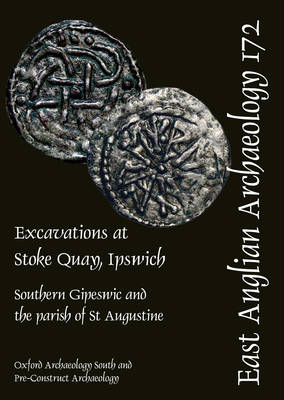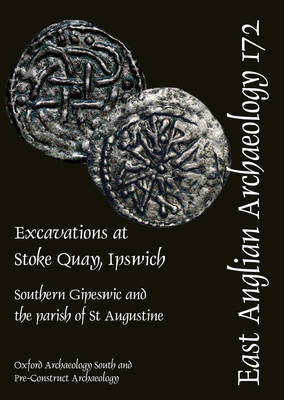
Je cadeautjes zeker op tijd in huis hebben voor de feestdagen? Kom langs in onze winkels en vind het perfecte geschenk!
- Afhalen na 1 uur in een winkel met voorraad
- Gratis thuislevering in België vanaf € 30
- Ruim aanbod met 7 miljoen producten
Je cadeautjes zeker op tijd in huis hebben voor de feestdagen? Kom langs in onze winkels en vind het perfecte geschenk!
- Afhalen na 1 uur in een winkel met voorraad
- Gratis thuislevering in België vanaf € 30
- Ruim aanbod met 7 miljoen producten
Zoeken
Excavations at Stoke Quay, Ipswich
Southern Gipeswic and the Parish of St Augustine
Richard Brown, Steven Teague, Louise Loe, Berni Sudds, Elizabeth Popescu
€ 69,95
+ 139 punten
Omschrijving
Ipswich is one of England's oldest urban centres. It has long been recognised as an emporium - a specialised, managed trading place of royal power within the eastern kingdom with royal input into trade and with commercial and diplomatic relations with the Frankish empire. Its origins are linked to a royal vill or centre, close to which settlement developed. Its archaeology is of international significance, but sadly remains obscured by the previous lack of publication. Understanding of the role of emporia has developed considerably in recent years and new evidence - such as that from Stoke Quay - is crucial to furthering such study. Fuelled by an industrious pottery industry and international trade, Gipeswic rapidly emerged in the 7th and 8th centuries as one of the first post-Roman settlements which could truly be described as a town.
Excavations by Oxford Archaeology and Pre-Construct Archaeology at Stoke Quay provide crucial new evidence about the urban fabric of Middle Saxon Ipswich, particularly since this is the first major excavation to have taken place south of the river. The remains demonstrate the setting out of plots, streets and buildings akin to the other wics (London, Southampton and York) and show strong influences from Frankia and Scandinavia. Industries, such as pottery production, led to substantial trade links with the continent and the town produced the first kiln-fired pottery made in Britain since the Romans on a quasi-industrial scale. The discovery of an exceptionally well-preserved Ipswich ware kiln at Stoke Quay is of crucial importance since it indicates that production was dispersed across a wider area of the town than was previously suspected. This has potential implications for settlement linked to craft specialisation.
During the Late Saxon and medieval periods, the site was dominated by the church and cemetery of St Augustine's, the precise location of which had been lost for 500 years. Sited in one of Ipswich's poorer areas, the population must surely have included 'men of the sea' as is suggested by the presence of reused boat timbers in many of the graves. The cemetery contained over 1,100 burials and this is the first group of burials associated with a major English port to have been archaeologically excavated and analysed: the findings indicate that the group is quite distinct from other non-port populations.
Once the church had fallen from use, the site and its environs saw commercial and industrial use, including a cooperage and shipyard, that reflects the development of Ipswich into its modern form.
Excavations by Oxford Archaeology and Pre-Construct Archaeology at Stoke Quay provide crucial new evidence about the urban fabric of Middle Saxon Ipswich, particularly since this is the first major excavation to have taken place south of the river. The remains demonstrate the setting out of plots, streets and buildings akin to the other wics (London, Southampton and York) and show strong influences from Frankia and Scandinavia. Industries, such as pottery production, led to substantial trade links with the continent and the town produced the first kiln-fired pottery made in Britain since the Romans on a quasi-industrial scale. The discovery of an exceptionally well-preserved Ipswich ware kiln at Stoke Quay is of crucial importance since it indicates that production was dispersed across a wider area of the town than was previously suspected. This has potential implications for settlement linked to craft specialisation.
During the Late Saxon and medieval periods, the site was dominated by the church and cemetery of St Augustine's, the precise location of which had been lost for 500 years. Sited in one of Ipswich's poorer areas, the population must surely have included 'men of the sea' as is suggested by the presence of reused boat timbers in many of the graves. The cemetery contained over 1,100 burials and this is the first group of burials associated with a major English port to have been archaeologically excavated and analysed: the findings indicate that the group is quite distinct from other non-port populations.
Once the church had fallen from use, the site and its environs saw commercial and industrial use, including a cooperage and shipyard, that reflects the development of Ipswich into its modern form.
Specificaties
Betrokkenen
- Auteur(s):
- Uitgeverij:
Inhoud
- Aantal bladzijden:
- 524
- Taal:
- Engels
- Reeks:
Eigenschappen
- Productcode (EAN):
- 9780904220841
- Verschijningsdatum:
- 28/04/2021
- Uitvoering:
- Hardcover
- Formaat:
- Genaaid
- Afmetingen:
- 213 mm x 297 mm
- Gewicht:
- 1882 g

Alleen bij Standaard Boekhandel
+ 139 punten op je klantenkaart van Standaard Boekhandel
Beoordelingen
We publiceren alleen reviews die voldoen aan de voorwaarden voor reviews. Bekijk onze voorwaarden voor reviews.









